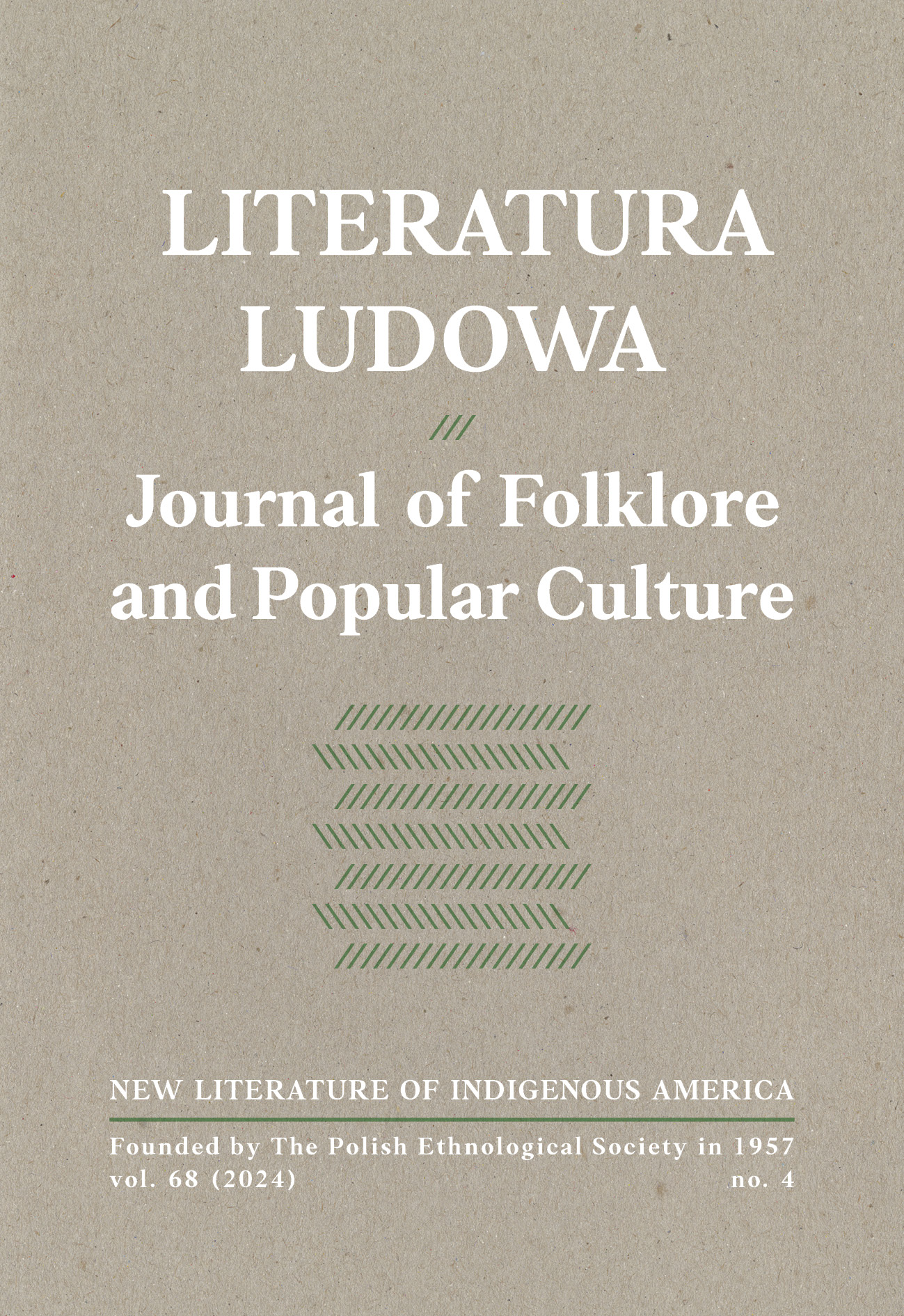Przemilczane historie. Rdzenna perspektywa w poezji Karenne Wood
DOI:
https://doi.org/10.12775/LL.4.2024.003Ključne riječi
historia, trybalografia, tradycja ustna, tożsamośćSažetak
Tekst jest próbą przybliżenia polskiemu czytelnikowi twórczości zmarłej w 2019 r. rdzennej poetki z narodu Monakanów, Karenne Wood. Poezja stanowiła w życiu tej artystki działalność niejako poboczną, głównym jej środkiem wyrazu był bowiem szeroko pojęty aktywizm. Poetka przez lata działała w Komisji Repatriacyjnej Krajowego Kongresu Indian Amerykańskich, aby następnie skupić swój wysiłek na zmianach w podstawie programowej nauczania historii, tak aby uwzględniała głos tubylczy i tworzyła miejsce dla alternatywnych, często przemilczanych wersji wydarzeń. Tekst przygląda się punktom stycznym tych dwóch działalności: wierszom, w których znane karty z historii kolonialnej zyskują nowe znaczenie poprzez odwrócenie perspektyw, a także tym utworom, które swą wymową całkowicie kontestują historię głównego nurtu. Ze względu na jasno określony, prospołeczny wydźwięk twórczości Wood celem tekstu jest próba wpisania jej poezji w koncepcję trybalografii, autorstwa pisarki z narodu Choctaw, LeAnne Howe. Według jednego z założeń tego pojęcia droga do utwierdzenia się rdzennej tożsamości oraz symbolicznego zadośćuczynienia wiedzie przez ciągłe negocjowanie przeszłości, a także uznania tradycji ustnej jako równoprawnego źródła historycznego.
References
Burns, D. (1984). Riding the One-Eyed Ford. Contact II Publications.
Causey, T. D., Wood, K. (2012). “Past Silence”: An Interview with Monacan Poet Karenne Wood. South Atlantic Review, 77(1/2), 192–197.
Chrystos. (1988). Not Vanishing. Press Gang Publishers.
Diaz, N. (2020). Postcolonial Love Poem. Faber & Faber.
Doerfler, J. (2014). Making It Work: A Model of Tribalography as Methodology. Studies in American Indian Literatures, 26(2), 65–74. https://doi.org/10.5250/studamerindilite.26.2.0065
Erdrich, L. (1984). Jacklight: Poems. Henry Holt.
Erdrich, H. E. (2018). Twenty-one Poets for Twenty-First Century. In H. E. Erdrich (ed.), New poets of Native Nations (pp. XI–XVI). Graywolf Press.
Fast, R. R. (2017). Review of Weaving the Boundary, by Karenne Wood. Studies in American Indian Literatures, 29(4), 102–106. https://doi.org/10.5250/studamerindilite.29.4.0102
Hogan, L. (1991). Red Clay, Poems & Stories. The Greenfield Review Press.
Howe, L. (1999). Tribalography: The Power of Native Stories. Journal of Dramatic Theory and Criticism, 1, 117–126.
Howe, L. (2002). The Story of America: A Tribalography. In N. Shoemaker (ed.), Clearing a Path: Theorizing the Past in Native American Studies (pp. 29–47). Routledge. https://doi.org/10.4324/9781315023113
Howe, L. (2008). Blind Bread and the Business of Theory Making, by Embarrassed Grief. In C. S. Womack, D. Heath Justice, C. B. Teuton (eds.), Reasoning Together: The Native Critics Collective (pp. 325–339). University of Oklahoma Press.
Matthews, W. (1979). Rising and Falling. Houghton Mifflin Harcourt.
Miłosz, C. (1978). Bells in Winter (transl. L. Valee, C. Miłosz). Hopewell. Monacan Indian Nation. (n.d.). Our History. Monacan Indian Nation. http://www.monacannation.com/our-history.html
Ortiz, S. (1984). Woven Stone. University of Arizona Press.
Pico, T. (2017). Nature Poem. Tin House.
Romero, Ch. (2014). Expanding Tribal Identities and Sovereignty through LeAnne Howe’s “Tribalography”. Studies in American Indian Literatures, 26(2), 13–25. https://doi.org/10.5250/studamerindilite.26.2.0013
Scheel, E. (n.d.). The Sioux Created a Landscape of Pastureland in Loudon and Fauquier Counties. The History of Loudoun County. https://www.loudounhistory.org/history/souix-indians-in-loudoun/
Sneider, L. (2012). Gender, Literacy, and Sovereignty in Winnemucca’s Life Among the Piutes. American Indian Quarterly, 36(3), 257–287. https://doi.org/10.5250/amerindiquar.36.3.0257
Sumac, S. (2018). you are enough: poems for the end of the world. Kegedonce Press.
Vizenor, G. R. (2008). Survivance: Narratives of Native Presence. University of Nebraska Press.
Warrior, R. A. (2008). Tribal Secrets: Recovering American Indian Intellectual Traditions. University of Minnesota Press.
Weaver, J. (1997). That the People Might Live: Native American Literatures and Native American Community. Oxford University Press.
Westerman, G. N. (2018). Dakota Homecoming. In H. E. Erdrich (ed.), New poets of Native Nations (p. 71). Graywolf Press.
Williams, M. (n.d.). Of History and Hope. Poetry Foundation. https://www.poetryfoundation.org/poets/miller-williams
Womack, C. (1999). Red on Red: Native American Literary Separatism. University of Minnesota Press.
Wood, K. (2001). Markings on Earth. University of Arizona Press.
Wood, K. (2016). Weaving the Boundary. University of Arizona Press.
Virginia Humanities (2019, 24 July). Remembering Karenne Wood. Virginia Humanities. https://virginiahumanities.org/2019/07/remembering-karenne-wood/
Ziarkowska, J. (2019). Bringing Things Together: Tribalography, Lakota Language, and Communal Healing in Frances Washburn’s Elsie’s Business and The Sacred White Turkey. Review of International American Studies, 12(1), 45–64. https://doi.org./10.31261/rias.6989
Downloads
Objavljeno
How to Cite
Broj časopisa
Rubrika
License
Copyright (c) 2025 Gabriela Jeleńska

This work is licensed under a Creative Commons Attribution-NoDerivatives 4.0 International License.
1. The authors give the publisher (Polish Ethnological Society) non-exclusive license to use the work in the following fields:a) recording of a Work / subject of a related copyright;
b) reproduction (multiplication) Work / subject of a related copyright in print and digital technique (ebook, audiobook);
c) marketing of units of reproduced Work / subject of a related copyright;
d) introduction of Work / object of related copyright to computer memory;
e) dissemination of the work in an electronic version in the formula of open access under the Creative Commons license (CC BY - ND 3.0).
2. The authors give the publisher the license free of charge.
3. The use of the work by publisher in the above mentioned aspects is not limited in time, quantitatively nor territorially.
Stats
Number of views and downloads: 416
Number of citations: 0



